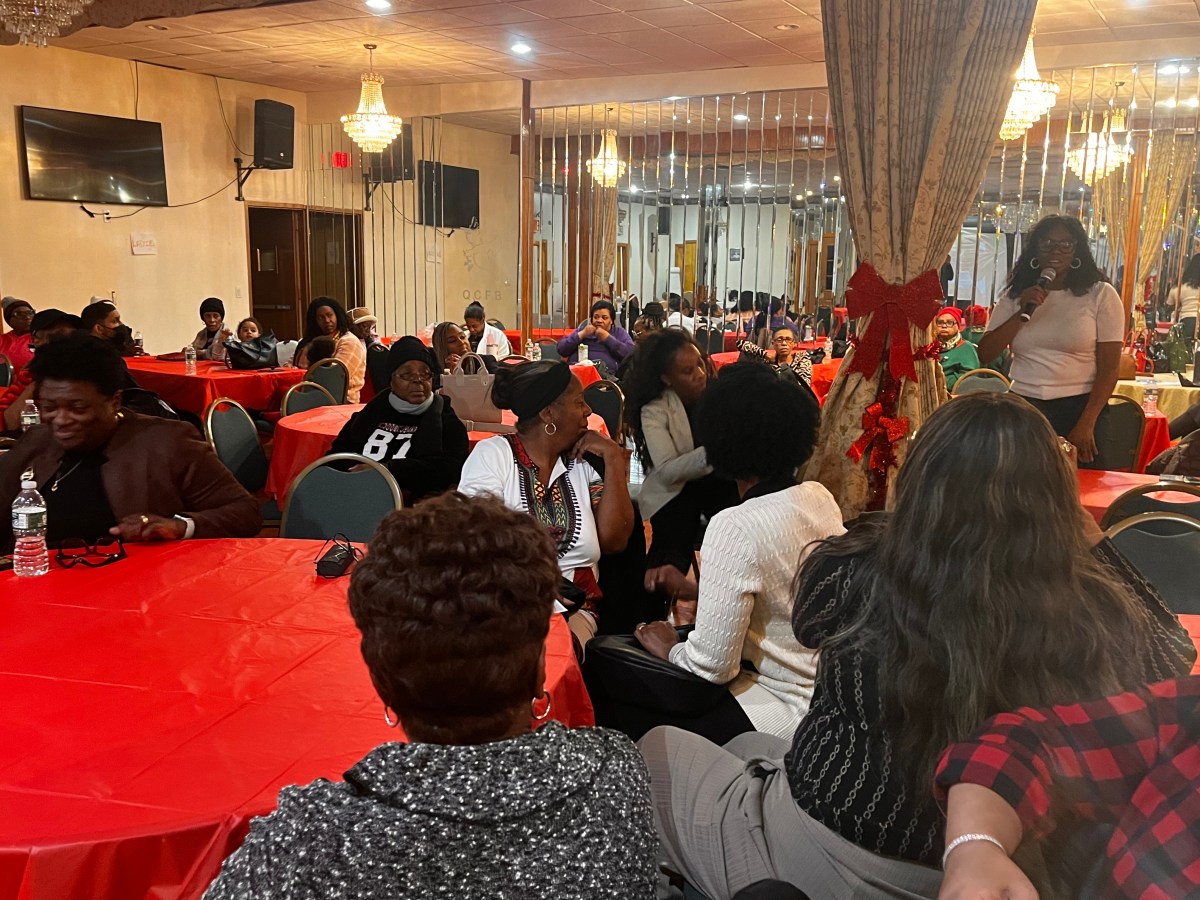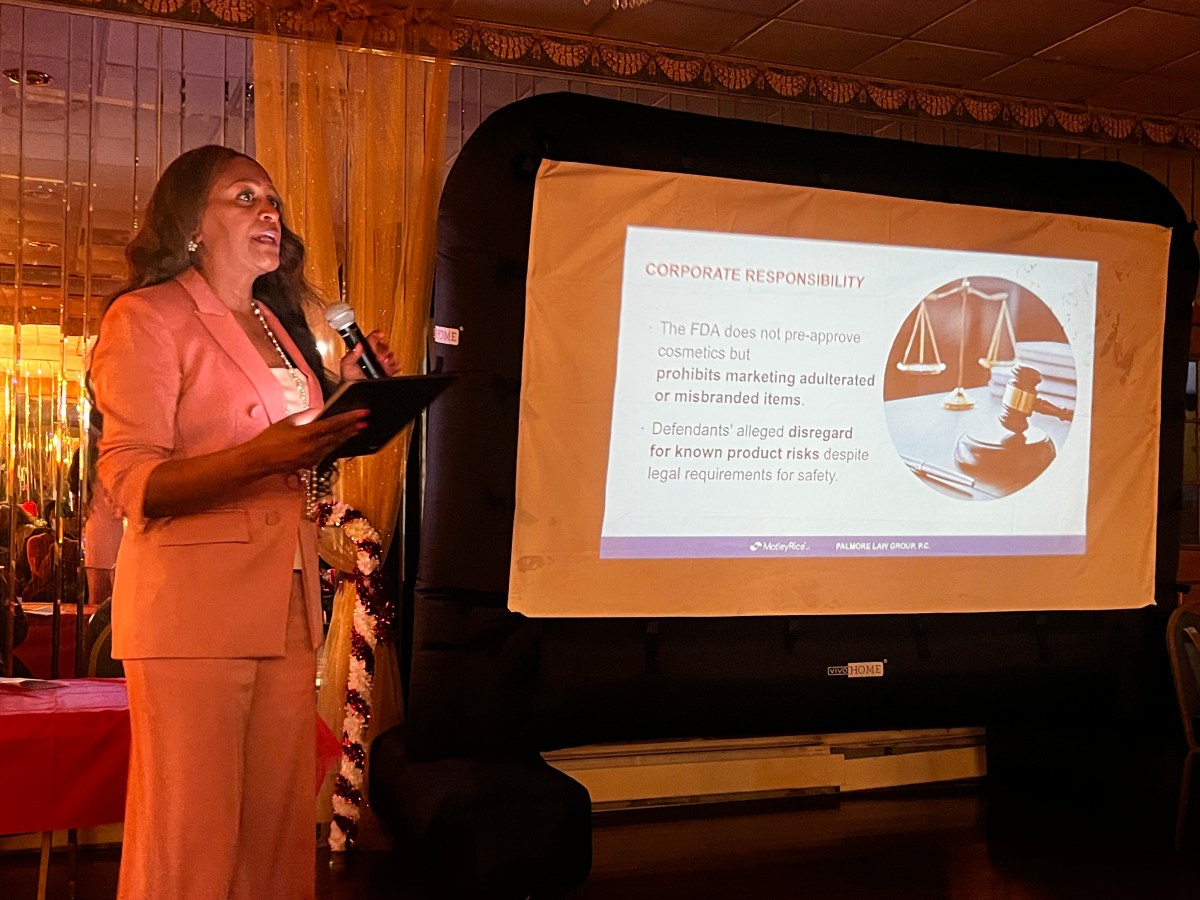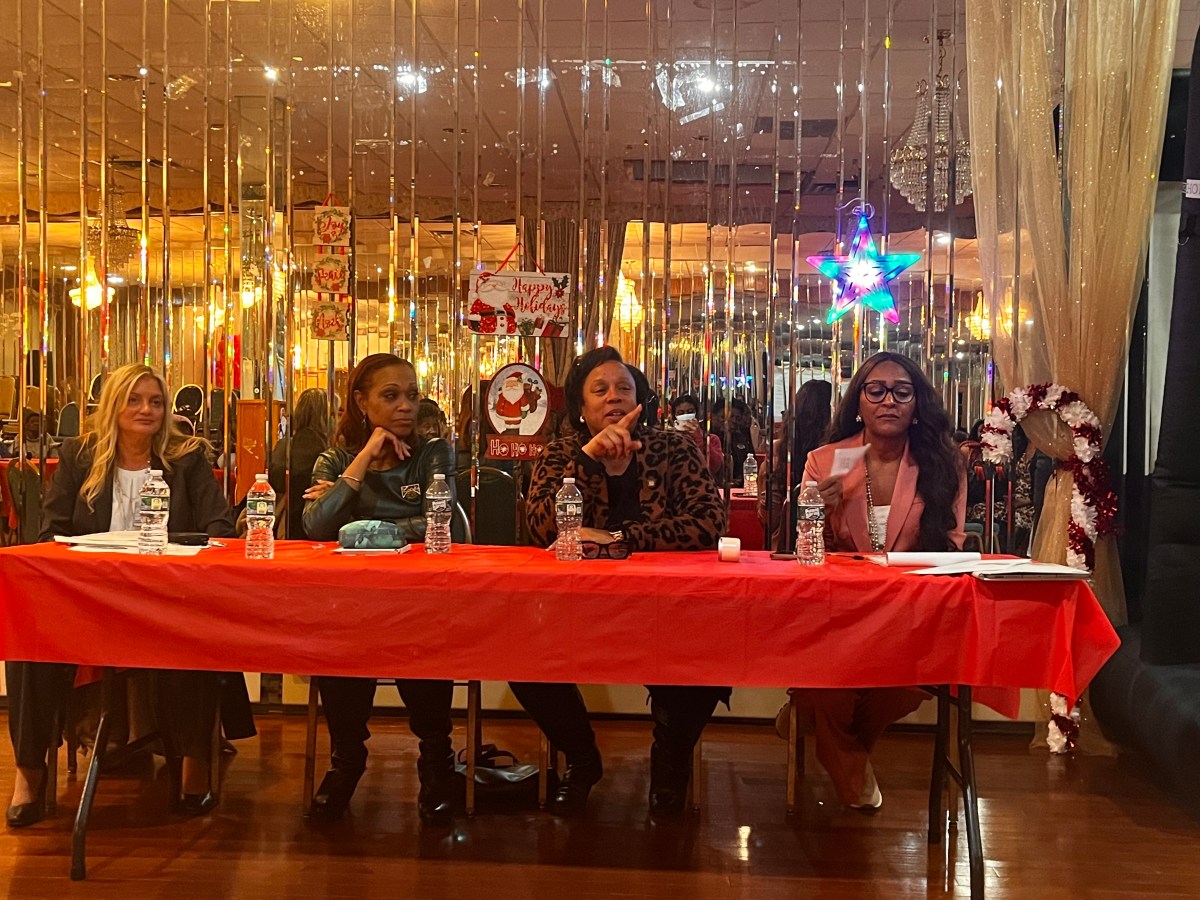Assembly Member Alicia Hyndman and the Greater Queens NY Chapter of the Links held an awareness event in Laurelton on Tuesday, Dec. 17, about the harmful effects of hair relaxers.
Hyndman was joined by a panel of women, including Tonya Cantlo, president of the Greater Queens (NY) Chapter of The Links, Vanessa Baird-Streeter, president and CEO of the Health and Wellness Council of Long Island, Attorney Heather Palmore, and Linda Bulone Research Nurse Manager at Queens Hospital at the event, hosted at Queens Church of the First Born, located at 226-01 Merrick Blvd.
Dozens of women attended the event, which discussed the possible link between chemical hair relaxers and adverse health effects, including reproductive cancer. Palmore also discussed how she and other attorneys are currently spearheading litigation to hold companies accountable, as well as a discussion on legislation for better product transparency.
Much of the presentation focused on how Black women are disproportionately affected by chemical hair relaxers due to the normalization of relaxers in the community.
The panelists shared similar experiences of how they grew up having their hair relaxed. “We know in our communities that we are introduced to it at a very, very, very young age. Our parents are working, it makes it a little bit more easy and manageable to deal with our hair but never realizing the health effects that these chemicals…can do to our bodies,” said Baird-Streeter. Baird Streeter and many of the panelists added that the early-on normalization of hair relaxers and how straightened hair appeals to the mainstream beauty standards finds many Black women feeling “hooked” on chemically straightening their hair.
Cantlo recalled that she transitioned from using relaxers after she was diagnosed with breast cancer in 2015. After undergoing surgeries and chemotherapy, she was advised by her treatment facility to stop relaxing her hair after her treatment. “I thought that it was interesting that it took me to be diagnosed with breast cancer for this institution to say that you shouldn’t be relaxing your hair and you should not be using certain deodorants,” she said.

Palmore also shared her experience with hair relaxers, saying that as an attorney with over 3 decades of court experience, she always felt “pressure to achieve a certain aesthetic.” “Whether that’s true today, I think all of us can think back to the 70s, 80s, 90s, and early 2000s when there was a lot of pressure for us to wear our hair a certain way. Thank goodness it’s not as much pressure, but it does exist,” she said. Palmore said she first relaxed her hair at 12 years old, as she wanted to get her hair straightened for a recital without sweating it out. “We had a pool in the backyard, and it was a chore to even get us in the pool because we didn’t want to mess up our hair,” she said.
Palmore explained that she decided to start a nationwide class action lawsuit against hair relaxer companies in 2022 after reading a study conducted by the Endocrine Society, revealing a link between hair relaxers and endocrine disruptors.
The lawsuit alleges that the chemicals in hair relaxers are linked to reproductive cancers -endometrial, ovarian, and uterine and that product manufacturers falsely advertised the safety of their products and targeted their products to women and children of color in their advertisements.
Palmore explained that the litigation is an intersection of beauty, consumer health, and law and justice. “It raises concern about product safety, our regulators, the FDA, and their role or their hands-off approach to this,” she said. According to Palmore, hair relaxers are not regulated by the FDA, which she says puts the responsibility on corporations to make sure that the products they are selling are safe.
Palmore gave examples of companies marketing to children, including Just For Me, a chemical relaxer she said was advertised to Black girls as young as four. “There are a number of young women who are now approximately 40 years old… where that product was really pushed out. They are a group of women like all of us that must be vigilant in what they are putting in their bodies.” So far, over 8,000 women are a part of the lawsuit, with some of the claimants having already passed away from their cancer diagnoses.
Palmore said that to be eligible to join the lawsuit, the interested party or a family member must have an ovarian, uterine, or endometrial cancer diagnosis, have used hair relaxer products within the last 10 years, and have used the products for at least 4 times a year.
For Palmore, the lawsuit is a strong message to companies selling these products. “It matters because it says to the companies you can’t do this to us, and we’re going to make sure that you never make money again off of our blood,” she said. “Many of my clients, unfortunately, are deceased. I get people who come to me all the time who say my mother passed away five years ago. Does she qualify? Absolutely,” she said.
Other points of the discussion centered around legislation regarding more product label transparency regarding harmful chemicals that are present in hair relaxers. Hyndman shared that she introduced a bill in 2020 that requires relaxers to have clear and conspicuous warning labels if they contain dangerous chemicals. “Just like when you go and buy a pack of cigarettes, the surgeon general warns you what this may do to your health, the same thing with vaping, same thing with cannabis, the same thing with alcohol,” she said. “The goal is to get this over the finish line,” Hyndman said.
Bulone shared from a clinical research perspective how important it is to conduct studies on the link between relaxer usage and reproductive cancer in Black women. “We do need participation, and forums like this are very helpful because not only does it help to get bills passed, the warning needs to be put on these products at the very least, if not, have them taken off the market once we get more evidence,” she said.

Bulone also referenced the Sister Study, which was based on 50,844 women who had breast cancer. The study examined the environmental and genetic risk factors for breast cancer and other diseases among the participants.
Bulone said that the study found a pattern where women had a 4 times higher risk of uterine cancer when using relaxers at least 4 times a year.
According to Bulone, although the study had over 86.2% white participants, researchers came to a conclusion about the relaxers through the 7.7% of Black women participating due to the volume of usage of relaxers in that group.
Many of the panelists emphasized encouraging younger Black women to embrace their natural hair and protective styles. “You all have access to so much information… there are so many young women who are doing natural hairstyles,” Hyndman said.
They also shared that product labels on relaxers will help younger women be fully informed about the chemicals in hair relaxers. “What I even did with my niece I encouraged her not to get a perm, wear her hair natural, think of protective styles to wear…and she doesn’t have to worry about undoing the damage. At least having labels on a product will give you a choice,” Palmore said.


































